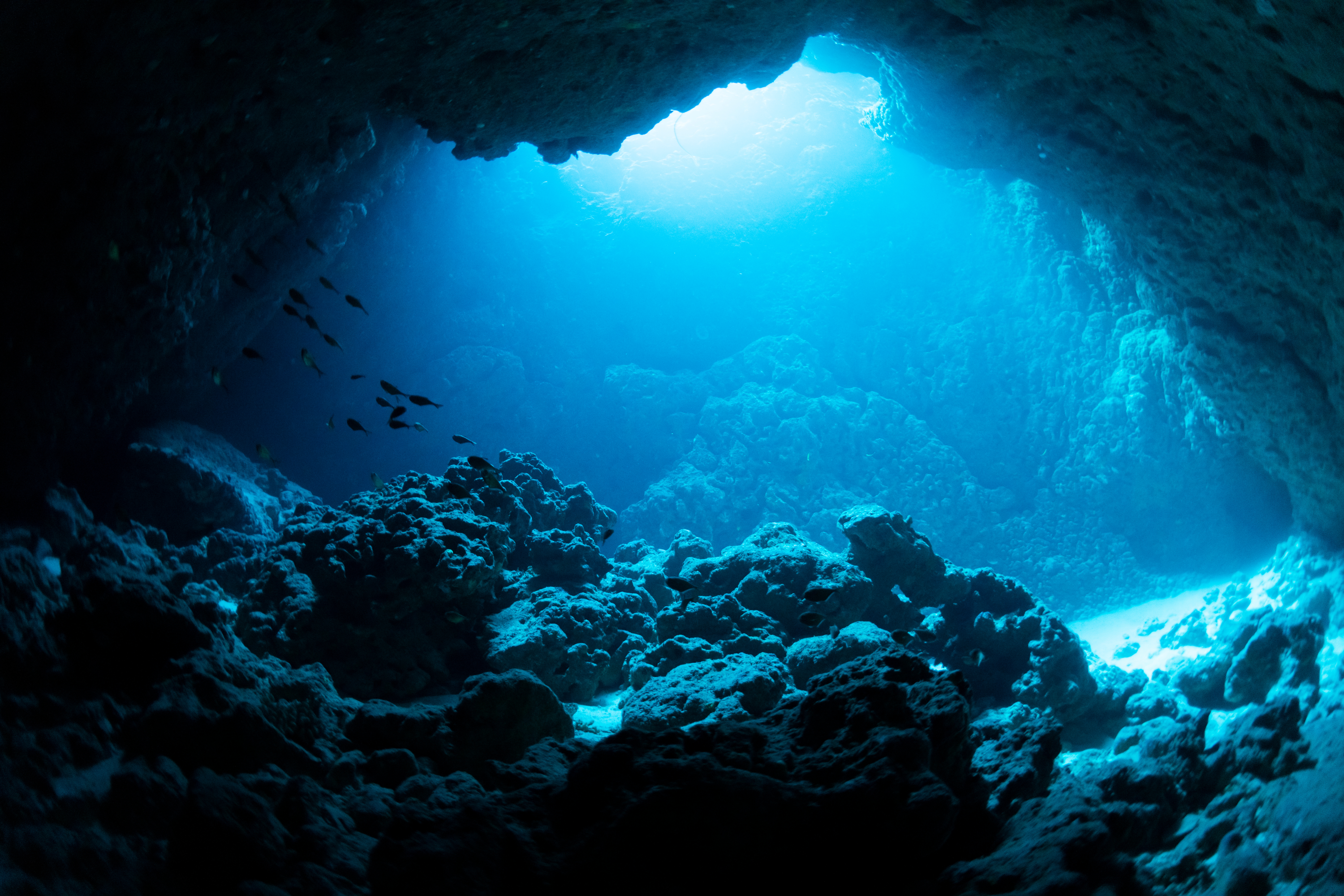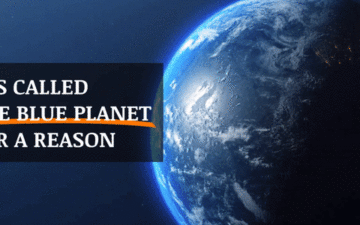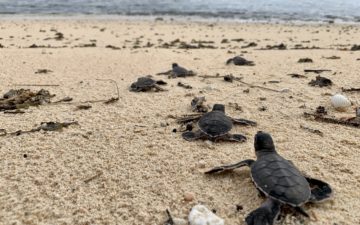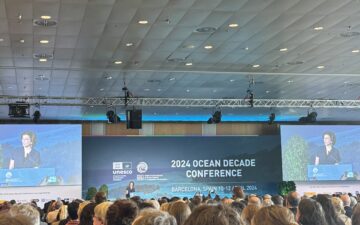As part of our ongoing work to tell the scientific, financial, and legal truth about deep seabed mining (DSM), The Ocean Foundation participated in the International Seabed Authority (ISA)’s most recent meetings during Part II of the 27th Session (ISA-27 Part II). We are honored that ISA Member States approved our application for official Observer status in the course of this meeting. Now, TOF can participate as an Observer in its own capacity, in addition to collaborating as part of the Deep Sea Conservation Coalition (DSCC). As Observers, we can participate in the work of the ISA, including to offer our perspective during deliberations, but cannot take part in decision-making. However, our appreciation for becoming a new Observer was dampened by the glaring absence of so many other key stakeholder voices.
The United Nations Convention on the Law of Sea (UNCLOS) defined the seabed beyond any country’s national jurisdiction as “the Area.” Further, the Area and its resources are the “common heritage of [hu]mankind” to be managed for the benefit of all. The ISA was created under UNCLOS to regulate the resources of the Area and to “ensure effective protection of the marine environment.” To that end, the ISA has developed exploration regulations and has been working toward developing exploitation regulations.
After years of unhurried motion toward developing those regulations to govern the deep seabed as the common heritage of humankind, the Pacific Island nation of Nauru has placed pressure (via what some call the “two-year rule”) on the ISA to finalize the regulations – and accompanying standards and guidelines – by July 2023 (While some believe that the ISA is now against the clock, many Member States and Observers have expressed their opinion that the “two-year rule” does not obligate states to authorize mining). This attempt to rush the finalization of regulations dovetails with a false narrative, pushed aggressively by would-be ocean miner The Metals Company (TMC) and others, that deep sea minerals are required to decarbonize our global energy supply. Decarbonization is not dependent on seabed minerals like cobalt and nickel. In fact, battery makers and others are innovating away from those metals, and even TMC admits that rapid technological changes may reduce demand for seabed minerals.
ISA-27 Part II was busy, and there are great summaries available online, including one by the Earth Negotiations Bulletin. These meetings made clear just how little even deep ocean experts know: scientific, technical, financial, and legal uncertainties dominated discussions. Here at TOF, we’re taking the opportunity to share a few points that are particularly important to our work, including where things stand and what we are doing about it.
All of the necessary stakeholders are not present at the ISA. And, those who do attend as official Observers are not given the time they need to provide their views.
At ISA-27 Part II, there was growing recognition of the many diverse stakeholders with an interest in the governance of the deep sea and its resources. But questions abound regarding how to get those stakeholders in the room, and ISA-27 Part II was, unfortunately, bookended by glaring failures to include them.
On the first day of meetings, the ISA Secretariat cut the live stream feed. Member State delegates, Observers,, media, and other stakeholders who were unable to attend – whether because of COVID-19 concerns or limited capacity in the venue – were left not knowing what had happened or why. Amidst significant backlash, and in lieu of having Member States vote on whether to broadcast the meetings, the webcast was turned back on. In another instance, one of only two youth delegates was interrupted and cut short by the Acting President of the Assembly. There were also concerns regarding the impropriety of how the Secretary General has referred to ISA stakeholders, including negotiators from Member States themselves, on video and in other contexts. On the last day of the meetings, arbitrary time limits were imposed on Observer statements immediately before Observers were granted the floor, and those who surpassed them had their microphones turned off.
The Ocean Foundation intervened (offered an official statement) at ISA-27 Part II to note that the relevant stakeholders for the common heritage of humankind are, potentially, all of us. We urged the ISA Secretariat to invite diverse voices to the DSM conversation – especially youth and Indigenous voices — and open the door to all ocean users such as fishers, wayfarers, scientists, explorers, and artists. With that in mind, we asked the ISA to proactively seek out these stakeholders and welcome their input.
The Ocean Foundation’s goal: For all affected stakeholders to engage on deep seabed mining.
In collaboration with many others, we are spreading the word about how DSM would affect all of us. We will work continuously and creatively to make the tent bigger.
- We are elevating the conversations around DSM where we can, and encouraging others to do the same. We all have a unique set of interests and contacts.
- Because the ISA has not proactively sought out all stakeholders, and because DSM – were it to go forward – would affect everyone on earth, we are working to take discussion around DSM, and why we support a moratorium (a temporary prohibition), to other international conversations: the United Nations General Assembly (UNGA), the 5th Session of the Intergovernmental Conference (IGC) on the Conservation and sustainable use of marine biological diversity beyond areas of national jurisdiction (BBNJ), the United Nations Framework Convention on Climate Change (UNFCCC) Conference of the Parties (COP27), and the High Level Political Forum on Sustainable Development. DSM needs to be discussed across international legal frameworks and addressed collectively and comprehensively.
- We are encouraging smaller fora as equally important venues for this discussion. This includes national and subnational legislatures in coastal nations surrounding the Clarion Clipperton Zone, fisheries groups (including Regional Fishery Management Organizations- who make decisions about who fishes where, what gear they use and how many fish they can catch), and youth environmental meetings.
- We are building on our deep experience in capacity building to identify stakeholders – and help those stakeholders navigate engagement options at the ISA, including but not limited to the official Observer application process.
Human rights, environmental justice, Indigenous rights and knowledge, and intergenerational equity were prominent in discussions during all three weeks of meetings.
Many Member States and Observers discussed the rights-based implications of potential DSM. Concerns were raised about perceived inaccuracies in the way the ISA Secretary General has characterized the ongoing work at the ISA in other international fora, alleging or implying consensus toward finalizing regulations for and authorizing DSM when that consensus does not exist.
The Ocean Foundation believes that DSM is a threat to underwater cultural heritage, food sources, livelihoods, liveable climate, and the marine genetic material of future pharmaceuticals. At ISA-27 Part II, we stressed that the United Nations General Assembly Resolution 76/75 recently recognised the right to a clean, healthy, and sustainable environment as a human right, noting that this right is related to other rights and existing international law. The work of the ISA does not exist in a vacuum, and must – like the work undertaken under all multilateral agreements consistently across the UN system – be in furtherance of this right.
The Ocean Foundation’s goal: To see further integration of DSM and its potential effects on our ocean, climate, and biodiversity across global environmental conversations.
We believe that the current global impetus to break down silos and see global governance as necessarily interconnected (for example, via the Ocean and Climate Change Dialogues) is a rising tide that will lift all boats. In other words, engagement with and contextualization within the global environmental regime will not undermine, but instead strengthen, the United Nations Convention on the Law of the Sea (UNCLOS).
Consequently, we believe that ISA Member States will be able to honor and respect UNCLOS while acting with concern and respect for developing nations, Indigenous communities, future generations, biodiversity, and ecosystem services – all while relying on the best available science. The Ocean Foundation strongly supports the calls for a moratorium on DSM to incorporate stakeholder concerns and science.
Underwater Cultural Heritage is not receiving due attention in ISA negotiations.
While cultural value has been discussed as an ecosystem service, underwater cultural heritage is not top of mind at recent ISA discussions. In one example, despite stakeholder comments that a Regional Environmental Management Plan should consider tangible and intangible cultural heritage and traditional knowledge, the most recent draft of the plan references only “archaeological objects.” TOF intervened twice at ISA-27 Part II to request further recognition of underwater cultural heritage and suggest that the ISA proactively reach out to relevant stakeholders.
The Ocean Foundation’s goal: Uplift underwater cultural heritage and make sure it is a clear part of the DSM conversation before it is inadvertently destroyed.
- We will work to ensure that our cultural heritage is an integral part of DSM discussion. This includes:
- tangible cultural heritage, such as downed military craft over the Pacific, or shipwrecks and human remains in the Atlantic in the Middle Passage, where during the transatlantic slave trade, an estimated 1.8+ million Africans did not survive the voyage.
- intangible cultural heritage,such as the living cultural heritage of Pacific peoples, including wayfinding.
- We recently sent a formal invitation for further cooperation between the ISA and UNESCO, and will continue to elevate the discussion of how to best protect underwater cultural heritage.
- TOF is engaged in research regarding tangible and intangible cultural heritage in both the Pacific and Atlantic.
- TOF is in conversation with other stakeholders regarding underwater cultural heritage, and will enable further engagement between those stakeholders and the ISA.
There is recognition of the gaps in knowledge surrounding the harm of DSM.
At ISA-27 Part II, there was increased recognition by Member States and Observers that, while there may be vast scientific gaps in the information we need to understand the deep ocean and its ecosystems, there is more than enough information to know that DSM will harm the deep. We stand to destroy a unique ecosystem which provides many critical ecosystem services including fish and shellfish for food; products from organisms that can be used for medicines; climate regulation; and historical, cultural, social, educational, and scientific value for people worldwide.
TOF intervened at ISA-27 Part II to state that we know ecosystems do not operate in isolation, even if there are still gaps in understanding how they connect. Potentially disturbing ecosystems before we even understand them – and doing so knowingly – would fly in the face of both environmental protection and advancement of intergenerational human rights. More specifically, doing so would go directly against Sustainable Development Goals.
The Ocean Foundation’s goal: To not destroy our deep sea ecosystem before we even know what it is, and what it does for us.
- We support using the United Nations Decade of Ocean Science for Sustainable Development as a platform for data gathering and interpretation.
- We will work to elevate cutting edge science, which shows that gaps in knowledge surrounding the deep sea are monumental and it will take decades to close them.
Stakeholders are taking a hard look at the status of finance for deep seabed mining and the real-world implications.
During recent ISA sessions, delegates have been looking at key financial issues and realizing that there still much work to be done internally. At ISA-27 Part II, TOF, the Deep Sea Conservation Coalition (DSCC), and other Observers urged ISA members to also look outward and see that the financial picture is bleak for DSM. Multiple Observers noted DSM has been found by the United Nations Environmental Program Sustainable Finance Initiative to be incompatible with a sustainable blue economy.
TOF noted that any potential source of funding for DSM activities would likely have to comply with internal and external Environmental, Social, and Governance (ESG) commitments potentially precluding funding for commercial DSM. The DSCC and other Observers pointed out that TMC, the main proponent of an accelerated timeline for DSM regulations, is in dire financial straits and that financial uncertainty has real-world implications for accountability, effective control, and liability.
The Ocean Foundation’s goal: To continue robust engagement with the financial and insurance industries on whether DSM is financeable or insurable.
- We will encourage banks and other potential sources of funding to take a look at their internal and external ESG and sustainability commitments to determine their compatibility with DSM funding.
- We will continue to counsel financial institutions and foundations on standards for sustainable blue economy investments.
- We will continue to monitor the financial instability and conflicting statements of The Metals Company.
Continuing work toward a moratorium on DSM:
At the United Nations Ocean Conference in Lisbon, Portugal in June 2022, clear concerns regarding DSM were raised throughout the week. TOF engaged in support of a moratorium unless and until DSM could proceed without harm to the marine environment, loss of biodiversity, threat to our tangible and intangible cultural heritage, or danger to ecosystem services.
At ISA-27 Part II, Chile, Costa Rica, Spain, Ecuador, and Federated States of Micronesia all called for some version of a pause. The Federated States of Micronesia announced that they were part of the Alliance of Countries calling for a Deep-Sea Mining Moratorium launched by Palau at the UN Ocean Conference.
The Ocean Foundation’s goal: To continue encouraging a moratorium on DSM.
Transparency in language is key to these discussions. While some shy away from the word, moratorium is defined as a “temporary prohibition.” We will continue to share information with countries and civil society about other existing moratoria and why a moratorium makes sense for DSM.
- We support, and will continue to support, national and subnational moratoria and bans on DSM.
- We have previously elevated the threat to our deep ocean ecosystem in our submission to the UN Ocean and Climate Change Dialogues, and will continue to do so in other international fora.
- We have working relationships with environmental decision makers in countries around the world, and are working to elevate the threat DSM poses in all conversations about ocean health, climate change, and sustainability.
- We will attend the next ISA meeting, ISA-27 Part III, held in Kingston, Jamaica from 31 October – 11 November, to deliver interventions in person.







